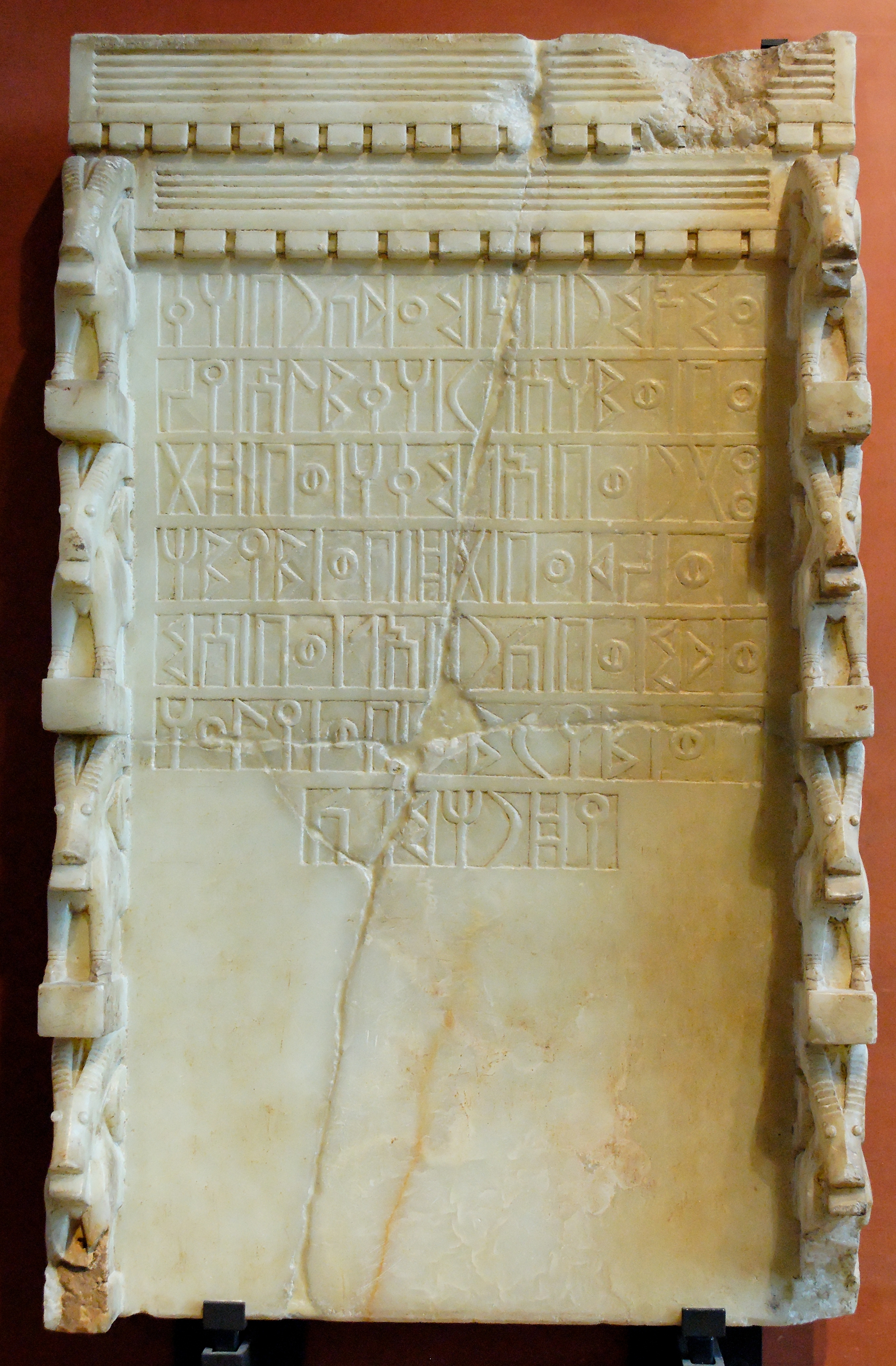by Greg Fisher and Michael Pregill
Over the past fifteen years, there has been a tremendous upsurge of interest in the historiography of late antique Arabia. This has happened as a result both of targeted studies as well as developments in late antique historiography more broadly. New studies authored or edited by Glen Bowersock, Averil Cameron, Greg Fisher (including work with Jitse Dijkstra), Robert Hoyland, and Christian Robin have contributed to a better understanding of a number of historical issues. These include the relationship of Arabia to its neighbors; the archaeology and history of different groups of people in the Arabian Peninsula; links between different communities, especially religious communities; alliances managed by Romans, Persians, and Himyarites with Arab clients; and the development of Arab “identity” prior to the seventh century.

Votive stele of alabaster with Sabaean inscription adressed to the moon-god Almaqah, ca. 700 BC, Yemen; held in the Department of Oriental Antiquities, Louvre Museum, Paris. Image accessed from Wikimedia Commons.
Over the same period, Qur’anic studies has developed in significant ways as well, particularly regarding the investigation of the literary compositions and religious discourses that may have provided the horizons and context of the emergence of the Qur’anic revelation. The Qur’an and Late Antiquity program unit, the newest in IQSA’s Annual Meeting lineup, seeks to promote knowledge of developments in Late Antique studies among scholars of the Qur’an and developments in Qur’anic studies among scholars of Late Antiquity, particularly in order to encourage better integration of these fields in the future. Our remit includes not only pre-Islamic Arabia and its immediate environs, but also the larger frame of late antique history, culture, religion, society, and politics in the Near East and Mediterranean regions as it may illuminate the background to the rise of Islam and its broad, long-term consequences.
CALL FOR PAPERS:
Chairs:
Greg Fisher, Department of History, Carleton University
Michael Pregill, Institute for the Study of Muslim Societies and Civilizations, Boston University
The Qur’an and Late Antiquity program unit focuses on investigation of and critical reflection on the historical context in which the Qur’an was revealed. We seek papers that illustrate significant textual parallels between the Qur’an and other literatures of Late Antiquity, especially those that contribute to a better understanding of the Qur’an’s place in its cultural, political, social, and religious environment. We also seek papers that interpret the rise of the Qur’anic community in a broader phenomenological, sociological, or historiographic context, whether that of pre-Islamic Arabian society or the Roman and Sasanian Empires that dominated the eastern Mediterranean and Near East in this period. Particular attention will be paid to such questions as processes of political consolidation and legitimation, construction of communal boundaries, and relationships between communities and polities.
For the 2015 IQSA Annual Meeting in Atlanta (November 20-23), we will sponsor two panels. First, we invite paper proposals for a panel on recent developments in the historiography of Late Antiquity as it pertains to the Qur’anic milieu in pre-Islamic Arabia or the wider context of the Roman and Sasanian dominions. This panel will be co-sponsored by the AAR Traditions of Eastern Late Antiquity group. We especially encourage submissions that attempt to achieve a broader synthesis of cultural, political, and religious trends beyond the analysis and comparison of textual corpora.
We also invite paper proposals for a panel to be co-sponsored with the SBL Religious World of Late Antiquity program unit. This panel, the first of two to be presented in consecutive years, will feature papers on the intersection of religion and violence in Late Antiquity as it pertains specifically to the Qur’an and the Qur’anic milieu. The panel takes as its inspiration Thomas Sizgorich’s groundbreaking work Violence and Belief in Late Antiquity: Militant Devotion in Christianity and Islam. We especially encourage proposals that engage Sizgorich’s work directly and explicitly, whether on a historical, thematic, or methodological level.
© International Qur’anic Studies Association, 2015. All rights reserved.
